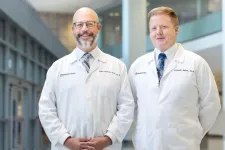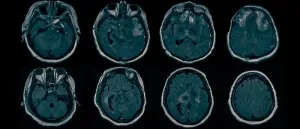(Press-News.org) In the rush to harness artificial intelligence and machine learning tools to make care more efficient at hospitals nationwide, a new study points to another possible use: identifying patients with non-medical needs that could affect their health and ability to receive care.
These social determinants of health – everything from transportation and housing to food supply and availability of family and friends as supports – can play a major role in a patient’s health and use of health care services.
The new study focuses on a patient population with especially complex needs: people with Alzheimer’s disease or other forms of dementia. Their condition can make them especially reliant on others to get them to medical appointments and social activities, handle medications and finances, shop and prepare food, and more.
The results of the study show that a rule-based natural language processing tool successfully identified patients with unstable access to transportation, food insecurity, social isolation, financial problems and signs of abuse, neglect, or exploitation.
The researchers found that a rule-based NLP tool – a kind of AI that analyzes human speech or writing – was far superior to deep learning and regularized logistic regression algorithms for identifying patients’ social determinants of health.
However, even the NLP tool did not do well enough at identifying needs related to housing or affording or taking medication.
The study was led by Elham Mahmoudi, Ph.D., a health economist at Michigan Medicine, the University of Michigan’s academic medical center, and Wenbo Wu, Ph.D., who completed the work while earning a doctorate at the U-M School of Public Health and is now at New York University. Mahmoudi and two other authors are in the Department of Family Medicine.
They and their colleagues compared the SDOH-spotting capabilities of three different AI techniques, first training them on a set of 700 patient records to teach them the kinds of words and phrases to look for, and then using them on 300 records and judging the results.
The tools only looked at the anonymized contents of emergency department and inpatient social worker notes made between 2015 and 2019 in the electronic health records of 231 patients with dementia.
Mahmoudi says the team is now working to prospectively validate the NLP algorithm against the SDOH questionnaire that has recently begun to be provided to all primary care patients at Michigan Medicine. That will allow them to compare what the computer program finds and what patients say in response to questions about their situation.
“We are also preparing a pilot program that will evaluate the feasibility of an intervention that addresses these social determinants of health, and connect identified people with community resources,” said Mahmoudi. “In the meantime, we hope our current results show that this algorithm can be used by clinicians, case managers and social workers to proactively address the social needs of patients with dementia, and potentially other vulnerable patient populations.”
In addition to Mahmoudi and Wu, the study’s authors are Kaes J. Holkeboer and Lorrie Carbone LMSW of the U-M Department of Family Medicine, and Temidun O. Kolawole of Johns Hopkins University
National Institute on Aging (AG066582 and AG06361), Alzheimer's Association (AARG-NTF-20-685960)
Natural language processing to identify social determinants of health in Alzheimer's disease and related dementia from electronic health records, Health Services Research,, DOI:10.1111/1475-6773.14210 https://onlinelibrary.wiley.com/doi/10.1111/1475-6773.14210
END
Can AI help hospitals spot patients in need of extra non-medical assistance?
Test of machine learning techniques shows promise for scouring medical record notes for social determinants of health
2023-08-14
ELSE PRESS RELEASES FROM THIS DATE:
Study brings insight to kidney cancer with gene mutation
2023-08-14
A new study from clinicians and researchers at the University of Michigan Rogel Cancer Center, U-M Department of Pathology and the Michigan Center for Translational Pathology reveals findings from over 800 clinical assays performed for kidney patients with MiTF family gene mutations. This study, published in the American Journal of Clinical Pathology¸ is the largest series of its kind in kidney cancer and carries deep clinical and diagnostics implications.
The team, led by Rohit Mehra, M.D., performed over 800 clinical assays on the MiTF family genes TFE3 and TFEB in renal tumors with morphologic and biomarker alterations considered suspicious for MiTF family genetic mutations.
The ...
Elephant ancestors´ teeth evolved in response to long term changes in diet and climate in Africa
2023-08-14
The latest study about of proboscideans (elephants and their ancient relatives) from the University of Helsinki provides proof that some proboscideans started to adapt to locally grass-rich environments in East Africa first by changing their behavior and starting to feed more on grasses. This happened in some lineages of proboscideans, such as choerolophodonts, much earlier than has been thought until now, about 23 to 11 million years ago in parts of East Africa
Also, around 7 million years ago in the lake Turkana region, increasingly grass-rich diets of the earliest true ...
Cleveland Clinic study shows deep brain stimulation encouraging for stroke patients
2023-08-14
CLEVELAND: A first-in-human trial of deep brain stimulation (DBS) for post-stroke rehabilitation patients by Cleveland Clinic researchers has shown that using DBS to target the dentate nucleus – which regulates fine-control of voluntary movements, cognition, language, and sensory functions in the brain – is safe and feasible.
The EDEN trial (Electrical Stimulation of the Dentate Nucleus for Upper Extremity Hemiparesis Due to Ischemic Stroke) also shows that the majority of participants (nine out of 12) demonstrated ...
How our tastes influence our creativity
2023-08-14
What drives us to develop new ideas rather than settling for standard methods and processes? What triggers the desire to innovate at the risk of sacrificing time, energy, and reputation for a resounding failure? Creativity is based on complex mechanisms that we are only beginning to understand and in which motivation plays a central role. But pursuing a goal is not enough to explain why we favor some ideas over others and whether that choice benefits the success of our actions.
"Creativity can be defined as the ability to produce original ...
Inoue receives funding for group digital gaming: Experiences of older adults living with dementia in an activity for cognitive impairment
2023-08-14
Megumi Inoue, Associate Professor, Social Work, received funding for: "Group Digital Gaming: Experiences of Older Adults Living with Dementia in an Activity for Cognitive Impairment."
The purpose of this study is to examine the effects of a group digital gaming intervention on cognitive function, mood, and behaviors in people with early to moderate levels of dementia. A group digital gaming company, called Obie Technology, was developed to facilitate cognitive stimulation, physical exercise, and group interactions simultaneously. ...
IIR researchers receive funding for conference focused on refugee resettlement and STEM education
2023-08-14
James C. Witte, Professor, Sociology, Director, Institute for Immigration Research (IIR), and Michelle S. Dromgold-Sermen, Assistant Director, IIR, received funding for: "Refugee Resettlement and STEM Education."
This conference will focus on how STEM-oriented educational opportunities through high schools, registered apprenticeships, community college, and four-year institutions can all play a significant role in addressing urgent humanitarian needs, while also expanding the nation’s STEM workforce.
Participants will learn about the current refugee situation, how the Welcome Corps is a valuable addition to U.S. refugee ...
New study charts exposure to SARS-CoV-2 infection in Canada throughout the pandemic
2023-08-14
Most people in Canada now have hybrid immunity against SARS-CoV-2 through a mix of infection and vaccination, new research in CMAJ (Canadian Medical Association Journal) shows.
VIEW EMBARGOED ARTICLE
Using pan-Canadian blood sample data from a subset of studies backed by the COVID-19 Immunity Task Force (CITF), researchers from the CITF, in collaboration with those from supported studies, estimated changing levels of seroprevalence — from infection or vaccination, or both — over 3 time periods: prevaccination (March to November 2020), vaccine roll-out (December 2020 to November 2021) and the Omicron waves (December 2021 to March 2023). In the first 2 phases, seroprevalence from ...
Source of hidden consciousness in ‘comatose’ brain injury patients found
2023-08-14
NEW YORK, NY (Aug. 14, 2023)--Columbia researchers have identified brain injuries that may underlie hidden consciousness, a puzzling phenomenon in which brain-injured patients are unable to respond to simple commands, making them appear unconscious despite having some level of awareness.
“Our study suggests that patients with hidden consciousness can hear and comprehend verbal commands, but they cannot carry out those commands because of injuries in brain circuits that relay instructions from the brain to the muscles,” says study leader Jan Claassen, MD, associate professor of neurology at Columbia University Vagelos College of Physicians ...
Publicly fund nonsurgical procedures for transgender, gender diverse people
2023-08-14
Publicly fund nonsurgical procedures for transgender, gender diverse people
To support transgender and gender-diverse people, governments should consider publicly funding hair removal and other minimally invasive procedures, authors argue in a commentary in CMAJ (Canadian Medical Association Journal).
VIEW EMBARGOED ARTICLE
“Minimally invasive procedures such as hair removal and facial injectables may support the process of transition in a timely fashion; evidence supports their therapeutic benefits in the field of gender-affirming care,” write Drs. Katie Ross and Sarah Fraser, Faculty of Medicine, Dalhousie University, Halifax, Nova Scotia.
The ...
Chromium replaces rare and expensive noble metals
2023-08-14
Expensive noble metals often play a vital role in illuminating screens or converting solar energy into fuels. Now, chemists at the University of Basel have succeeded in replacing these rare elements with a significantly cheaper metal. In terms of their properties, the new materials are very similar to those used in the past.
We’re familiar with chromium from everyday applications such as chromium steel in the kitchen or chrome-plated motorcycles. Soon, however, the element may also be found in the screens of ubiquitous mobile phones or used to convert solar energy. Researchers led ...
LAST 30 PRESS RELEASES:
Prevalence of over-the-counter and prescription medication use in the US
US child mental health care need, unmet needs, and difficulty accessing services
Incidental rotator cuff abnormalities on magnetic resonance imaging
Sensing local fibers in pancreatic tumors, cancer cells ‘choose’ to either grow or tolerate treatment
Barriers to mental health care leave many children behind, new data cautions
Cancer and inflammation: immunologic interplay, translational advances, and clinical strategies
Bioactive polyphenolic compounds and in vitro anti-degenerative property-based pharmacological propensities of some promising germplasms of Amaranthus hypochondriacus L.
AI-powered companionship: PolyU interfaculty scholar harnesses music and empathetic speech in robots to combat loneliness
Antarctica sits above Earth’s strongest “gravity hole.” Now we know how it got that way
Haircare products made with botanicals protects strands, adds shine
Enhanced pulmonary nodule detection and classification using artificial intelligence on LIDC-IDRI data
Using NBA, study finds that pay differences among top performers can erode cooperation
Korea University, Stanford University, and IESGA launch Water Sustainability Index to combat ESG greenwashing
Molecular glue discovery: large scale instead of lucky strike
Insulin resistance predictor highlights cancer connection
Explaining next-generation solar cells
Slippery ions create a smoother path to blue energy
Magnetic resonance imaging opens the door to better treatments for underdiagnosed atypical Parkinsonisms
National poll finds gaps in community preparedness for teen cardiac emergencies
One strategy to block both drug-resistant bacteria and influenza: new broad-spectrum infection prevention approach validated
Survey: 3 in 4 skip physical therapy homework, stunting progress
College students who spend hours on social media are more likely to be lonely – national US study
Evidence behind intermittent fasting for weight loss fails to match hype
How AI tools like DeepSeek are transforming emotional and mental health care of Chinese youth
Study finds link between sugary drinks and anxiety in young people
Scientists show how to predict world’s deadly scorpion hotspots
ASU researchers to lead AAAS panel on water insecurity in the United States
ASU professor Anne Stone to present at AAAS Conference in Phoenix on ancient origins of modern disease
Proposals for exploring viruses and skin as the next experimental quantum frontiers share US$30,000 science award
ASU researchers showcase scalable tech solutions for older adults living alone with cognitive decline at AAAS 2026
[Press-News.org] Can AI help hospitals spot patients in need of extra non-medical assistance?Test of machine learning techniques shows promise for scouring medical record notes for social determinants of health




